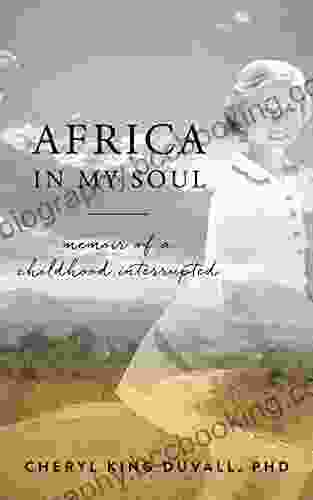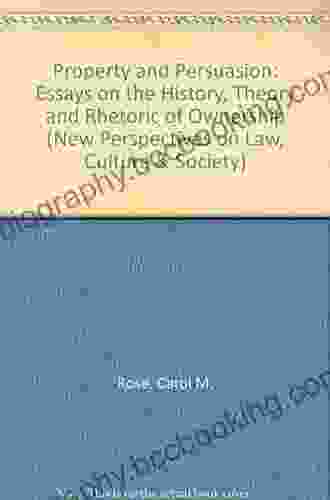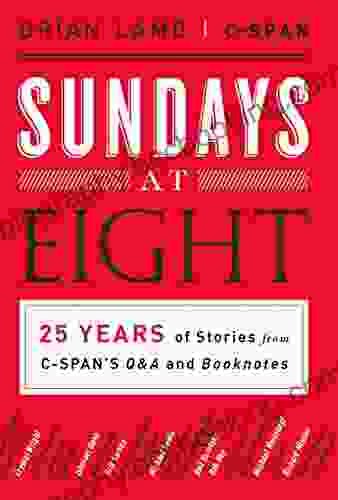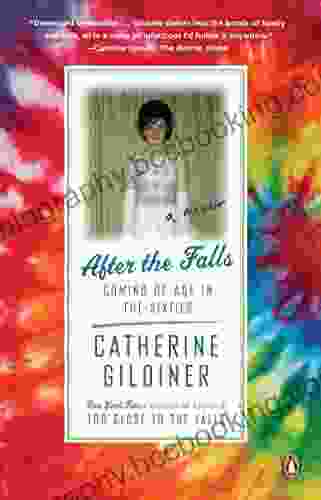Essays On The History Theory And Rhetoric Of Ownership

5 out of 5
| Language | : | English |
| File size | : | 2875 KB |
| Text-to-Speech | : | Enabled |
| Screen Reader | : | Supported |
| Enhanced typesetting | : | Enabled |
| Word Wise | : | Enabled |
| Print length | : | 317 pages |
This book explores the history, theory, and rhetoric of ownership, examining how the concept of ownership has shaped human societies and how it has been used to justify inequality and oppression.
The book is divided into three parts. The first part provides a historical overview of the concept of ownership, from its origins in ancient Greece and Rome to its development in the modern world. The second part examines the different theories of ownership that have been proposed by philosophers and economists, including natural rights theories, labor theories, and social contract theories. The third part analyzes the rhetoric of ownership, examining how the concept of ownership is used to justify inequality and oppression.
This book is a valuable resource for anyone interested in the history, theory, or rhetoric of ownership. It provides a comprehensive overview of the topic and offers a unique perspective on the ways in which ownership has shaped human societies.
Table of Contents
- Part One: The History of Ownership
- Part Two: The Theories of Ownership
- Part Three: The Rhetoric of Ownership
Part One: The History of Ownership
The concept of ownership has a long and complex history. The earliest known forms of ownership can be traced back to ancient Greece and Rome, where the concept of private property was first developed. In ancient Greece, the concept of ownership was based on the idea that individuals had a natural right to own property. This idea was later adopted by the Romans, who developed a more sophisticated concept of ownership that included the idea of usufruct, or the right to use and enjoy property.
The concept of ownership continued to develop in the Middle Ages, when the feudal system emerged. Under the feudal system, land was owned by the lord, and peasants had the right to use the land in exchange for providing labor and other services. The feudal system eventually gave way to the capitalist system, which is based on the idea that individuals have the right to own property and to use it to generate profit.
The concept of ownership has been used to justify a wide range of social and economic inequalities. In the United States, for example, the concept of ownership has been used to justify the dispossession of Native Americans and the enslavement of African Americans. In other parts of the world, the concept of ownership has been used to justify colonialism and imperialism.
Part Two: The Theories of Ownership
There are a number of different theories of ownership that have been proposed by philosophers and economists. These theories can be divided into three main categories: natural rights theories, labor theories, and social contract theories.
Natural rights theories argue that individuals have a natural right to own property. This right is based on the idea that individuals are rational beings who have the capacity to own and use property. Natural rights theories have been defended by a number of philosophers, including John Locke and Immanuel Kant.
Labor theories argue that individuals have a right to own the fruits of their own labor. This right is based on the idea that individuals have a moral claim to the products of their own labor. Labor theories have been defended by a number of economists, including Karl Marx and Adam Smith.
Social contract theories argue that individuals have a right to own property because they have agreed to live in a society that protects the right to property. This right is based on the idea that individuals have a moral obligation to abide by the laws of the society in which they live. Social contract theories have been defended by a number of philosophers, including John Rawls and Robert Nozick.
Part Three: The Rhetoric of Ownership
The concept of ownership is often used to justify inequality and oppression. This is because the concept of ownership can be used to create a sense of entitlement and to exclude others from access to resources. The rhetoric of ownership can be used to justify a wide range of social and economic policies, including:
- The privatization of public resources
- The dispossession of indigenous peoples
- The exploitation of workers
- The
5 out of 5
| Language | : | English |
| File size | : | 2875 KB |
| Text-to-Speech | : | Enabled |
| Screen Reader | : | Supported |
| Enhanced typesetting | : | Enabled |
| Word Wise | : | Enabled |
| Print length | : | 317 pages |
Do you want to contribute by writing guest posts on this blog?
Please contact us and send us a resume of previous articles that you have written.
 Book
Book Novel
Novel Page
Page Chapter
Chapter Text
Text Story
Story Genre
Genre Reader
Reader Library
Library Paperback
Paperback E-book
E-book Magazine
Magazine Newspaper
Newspaper Paragraph
Paragraph Sentence
Sentence Bookmark
Bookmark Shelf
Shelf Glossary
Glossary Bibliography
Bibliography Foreword
Foreword Preface
Preface Synopsis
Synopsis Annotation
Annotation Footnote
Footnote Manuscript
Manuscript Scroll
Scroll Codex
Codex Tome
Tome Bestseller
Bestseller Classics
Classics Library card
Library card Narrative
Narrative Biography
Biography Autobiography
Autobiography Memoir
Memoir Reference
Reference Encyclopedia
Encyclopedia Brent Runyon
Brent Runyon C L Simchick
C L Simchick Carla Jablonski
Carla Jablonski Brian Lopes
Brian Lopes Brian Sparks
Brian Sparks Bronwyn Cosgrave
Bronwyn Cosgrave Brian W Kernighan
Brian W Kernighan Brian Andrews
Brian Andrews Caroline Knapp
Caroline Knapp Brock Eide
Brock Eide Bryan A Williams
Bryan A Williams Brittany Anderson
Brittany Anderson Bryan Sullivan
Bryan Sullivan Brian J Robertson
Brian J Robertson Carson Tate
Carson Tate Carolyn Landon
Carolyn Landon Brian Kateman
Brian Kateman Brian Clegg
Brian Clegg Catherine Barr
Catherine Barr Caroline Miller
Caroline Miller
Light bulbAdvertise smarter! Our strategic ad space ensures maximum exposure. Reserve your spot today!
 Ed CooperFollow ·8.3k
Ed CooperFollow ·8.3k Graham BlairFollow ·18.4k
Graham BlairFollow ·18.4k Dan BellFollow ·12.5k
Dan BellFollow ·12.5k Mikhail BulgakovFollow ·10.3k
Mikhail BulgakovFollow ·10.3k Evan HayesFollow ·11.3k
Evan HayesFollow ·11.3k Francisco CoxFollow ·15.9k
Francisco CoxFollow ·15.9k Camden MitchellFollow ·18.6k
Camden MitchellFollow ·18.6k Cormac McCarthyFollow ·7.4k
Cormac McCarthyFollow ·7.4k

 Andy Hayes
Andy HayesUnveil the Rich Tapestry of Rural Life: Immerse Yourself...
Step into the enchanting pages of "Still...

 David Mitchell
David MitchellUnlocking the Depths of Cybersecurity: An In-Depth Look...
In the ever-evolving landscape of...

 Seth Hayes
Seth HayesUnlock the Secrets of Watercolor Landscapes: 37 Tools for...
Embark on a...

 Tyler Nelson
Tyler Nelson15 Insightful Answers to Questions on Uterine Fibroid
Uterine fibroids...

 Evan Hayes
Evan HayesAfrica In My Soul: A Literary Odyssey That Captivates the...
In a world where diverse cultures...
5 out of 5
| Language | : | English |
| File size | : | 2875 KB |
| Text-to-Speech | : | Enabled |
| Screen Reader | : | Supported |
| Enhanced typesetting | : | Enabled |
| Word Wise | : | Enabled |
| Print length | : | 317 pages |














